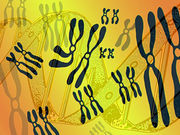Also linked to failed fertility treatments
MONDAY, Oct. 12, 2015 (HealthDay News) — Scientists report that a common gene variant may be linked to both early pregnancy loss and failed in-vitro fertilization (IVF) treatments. The findings were scheduled to be presented at the annual meeting of the American Society of Human Genetics (ASHG), held from Oct. 6 to 10 in Baltimore.
Rajiv McCoy, Ph.D., from the University of Washington in Seattle, and colleagues from Stanford University analyzed more than 46,000 embryos from about 2,400 IVF patients.
The investigators found the gene variant known as rs2305957 was strongly associated with risk of aneuploidy. They also discovered that embryos with this uneven distribution of chromosomes were more likely to have come from patients who had a failed IVF treatment in the past, suggesting treatment failure may have been due to aneuploidy.
“Surprisingly, about half of women had this genetic variant, and that rate is fairly consistent across populations,” McCoy said in an ASHG news release. “If it’s so damaging to reproduction, why does it appear so often? Why isn’t it selected against?” A nearby gene may also hold clues that could help scientists determine what causes aneuploidy. The study authors suspect PLK4, which governs the distribution of chromosomes as cells divide, may be involved. The researchers plan to investigate PLK4‘s role in development and why this gene variant linked to chromosome errors and early pregnancy loss remains common today.
Copyright © 2015 HealthDay. All rights reserved.








